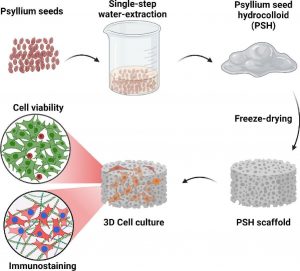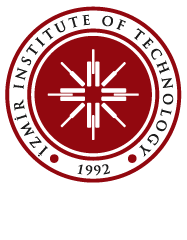June, 2024- Our article “Arabinoxylan-based psyllium seed hydrocolloid: Single-step aqueous extraction and use in tissue engineering” is published. Read more below.
https://doi.org/10.1016/j.ijbiomac.2024.131856
 Biomacromolecules derived from natural sources offer superior biocompatibility, biodegradability, and water-holding capacity, which make them promising scaffolds for tissue engineering. Psyllium seed has gained attention in biomedical applications recently due to its gel-forming ability, which is provided by its polysaccharide-rich content consisting mostly of arabinoxylan. This study focuses on the extraction and gelation of Psyllium seed hydrocolloid (PSH) in a single-step water-based protocol, and scaffold fabrication using freeze-drying method. After characterization of the scaffold, including morphological, mechanical, swelling, and protein adsorption analyses, 3D cell culture studies were done using NIH-3 T3 fibroblast cells on PSH scaffold, and cell viability was assessed using Live/Dead and Alamar Blue assays. Starting from day 1, high cell viability was obtained, and it reached 90 % at the end of 15-day culture period. Cellular morphology on PSH scaffold was monitored via SEM analysis; cellular aggregates then spheroid formation were observed throughout the study. Collagen Type-I and F-actin expressions were followed by immunostaining revealing a 9- and 10-fold increase during long-term culture. Overall, a single-step and non-toxic protocol was developed for extraction and gelation of PSH. Obtained results unveiled that PSH scaffold provided a favorable 3D microenvironment for cells, holding promise for further tissue engineering applications.
Biomacromolecules derived from natural sources offer superior biocompatibility, biodegradability, and water-holding capacity, which make them promising scaffolds for tissue engineering. Psyllium seed has gained attention in biomedical applications recently due to its gel-forming ability, which is provided by its polysaccharide-rich content consisting mostly of arabinoxylan. This study focuses on the extraction and gelation of Psyllium seed hydrocolloid (PSH) in a single-step water-based protocol, and scaffold fabrication using freeze-drying method. After characterization of the scaffold, including morphological, mechanical, swelling, and protein adsorption analyses, 3D cell culture studies were done using NIH-3 T3 fibroblast cells on PSH scaffold, and cell viability was assessed using Live/Dead and Alamar Blue assays. Starting from day 1, high cell viability was obtained, and it reached 90 % at the end of 15-day culture period. Cellular morphology on PSH scaffold was monitored via SEM analysis; cellular aggregates then spheroid formation were observed throughout the study. Collagen Type-I and F-actin expressions were followed by immunostaining revealing a 9- and 10-fold increase during long-term culture. Overall, a single-step and non-toxic protocol was developed for extraction and gelation of PSH. Obtained results unveiled that PSH scaffold provided a favorable 3D microenvironment for cells, holding promise for further tissue engineering applications.
